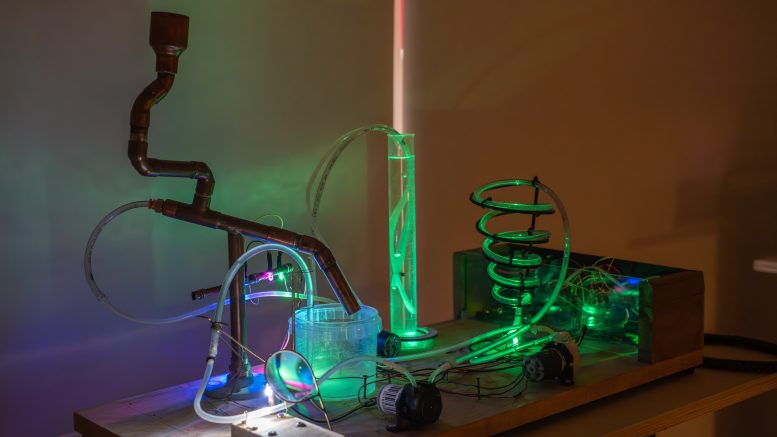As you walk into a darkened room, you are greeted with the sound of dripping water — at first slow and delicate, then increasingly insistent and dissonant.
It is not raining, nor has the roof sprung a leak. Rather, the sound is emanating from the walls of the Poolside Gallery.
You have entered the Environment Machine Shop.
A featured installation of this year’s Cluster Festival, the Environment Machine Shop is an interactive exhibit containing pumps, copper pipes, LEDs and “Victorian-era inspired” scientific instruments.
Six Petri dishes with water samples pulled from the Red, Assiniboine and Seine Rivers are lined up along the back wall. Lit from below, their shadows shimmer and quake. Combined with the eerie soundtrack, the effect is at once haunting and mundane.
Michael Lucenkiw, the artist behind the exhibit, said that the Machine Shop is an attempt to generate “ecological empathy.” He has been “kinda frustrated” with the “general attitude of Winnipeggers towards the Red River … that it’s polluted, it’s bad, it’s unsafe.” He stressed that, while the river has been impacted by sewage dumping, it “isn’t this gross cesspool that we make it out to be.”
This assessment is corroborated by a visual inspection of the samples, which — apart from a few nondescript floating bits — are much clearer in colour than the river’s murkiness would suggest.
And yet, the exhibit’s most intriguing feature is a testament to the presence of environmental contamination. The “pollution piano” is a synthesizer-like instrument where each key is hooked up to a test tube of water. When pressed, the tubes light up purple and emit a tone corresponding to the water’s conductivity.
“Many water samples will have some natural ability to conduct electricity” due to sedimentary accumulation, Lucenkiw explained. Samples with high levels of salt or heavy metal content will have greater conductivity and thus produce a higher pitch on the piano.
In Winnipeg, he was surprised to find that “most of the samples were pretty similar [in pitch].” By contrast, while testing his creation at the University of Windsor, the Detroit River’s tonal variation was considerably more pronounced.
The artist is now pursuing a Ph.D. in architecture at the University of Manitoba. To Lucenkiw, art and architecture “play off of each other quite a bit.” The exhibit has allowed him to field test his research on DIY biomaterials.
He hopes this research will eventually “empower communities” to carry out their own architectural projects cheaply and more sustainably.
The Environment Machine Shop is on display at Video Pool Media Arts Centre (300 – 100 Arthur St.) until July 12, 2024. Gallery hours are Wednesday through Friday from 1 p.m. to 5 p.m.


